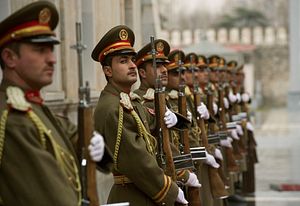In an interview Tuesday with TOLONews, Amar Sinha, the Indian ambassador to Afghanistan, called the idea of a proxy war between his country and Pakistan playing out in Afghanistan a myth.
[The] India-Pakistan war is somehow getting reflected in Afghanistan… we see many analysts and journalists [calling] it a proxy war, which is a myth. [Rather] it is a smokescreen created to justify Pakistan’s behavior, which has not been [that] of a friendly neighbor.
Sinha, nonetheless, says that India’s “proxy” in Afghanistan is the Afghan people and that Pakistan’s is the Taliban.
Talk of a proxy war between India and Pakistan in Afghanistan has gone both ways for some time. Indian Home Minister Rajnath Singh, whose ministry is responsible for internal security, said in March that Pakistan used terrorism as a weapon in its proxy war with India. Former President of Pakistan Pervez Musharraf said in an interview with the Wall Street Journal in February that “Pakistan and India both must stay away, and not to have this kind of a proxy war going on there.”
The Wall Street Journal did not miss the irony in Musharraf’s remarks as it outlined Islamabad’s support of the Taliban in Afghanistan:
Islamabad was one of the few governments to recognize the Taliban regime in the 1990s, and U.S. and Afghan officials long charged that Pakistan continued to play a “double game” after the Taliban government was toppled by the U.S.-led invasion in 2001, by providing support to an insurgent movement that reconstituted on Pakistani soil, while remaining a major U.S. ally and partner of the American-led coalition that was fighting the Taliban.
In her 2014 book, The Wrong Enemy, Carlotta Gall touches on the issue of Pakistan’s involvement in the Afghanistan war from the U.S. perspective. The title of the book refers directly to a quote from the late Richard Holbrooke, U.S. special representative to Afghanistan and Pakistan, who once said “we may be fighting the wrong enemy in the wrong country.”
Competition between India and Pakistan in Afghanistan is high and while the Karzai administration had better relations with India, it seems that the Ghani administration is beginning to lean more toward Pakistan. The EastWest Institute’s Col. James L. Creighton (U.S. Army, Ret.), told our own Ankit Panda in a recent podcast, that “when Ashraf Ghani visited Islamabad in November, that started off a rapprochement with Pakistan that continues to this day.”
Creighton points to positive movements in several security and economic areas as indicative of this rapprochement. This week a delegation from Pakistan attended meetings in Kabul to discuss bilateral trade, including a trade agreement currently in the works. According to MIT’s Observatory of Economic Complexity (which draws from the UN Comtrade database), Afghanistan’s largest export partner is Pakistan (47 percent in 2012) followed by India (22 percent in 2012).
With this seeming rapprochement between Afghanistan and Pakistan, India is keen to emphasize that Pakistan has not always been a good neighbor. In a recent memo, the Council on Foreign Relations’ Alyssa Ayres argues that India could be an even better friend to Afghanistan, especially when it comes to security as the U.S. pulls back, but that “New Delhi’s concerns about poking a Pakistani hornets’ nest have limited the security partnership.”

































